 MyDogBreeds
MyDogBreeds Bichonpoo is originated from Australia but Berger Blanc Suisse is originated from Switzerland. Bichonpoo may grow 31 cm / 12 inches shorter than Berger Blanc Suisse. Bichonpoo may weigh 32 kg / 70 pounds lesser than Berger Blanc Suisse. Bichonpoo may live 3 years more than Berger Blanc Suisse. Bichonpoo may have less litter size than Berger Blanc Suisse. Bichonpoo requires High maintenance. But Berger Blanc Suisse requires Moderate maintenance
Bichonpoo is originated from Australia but Berger Blanc Suisse is originated from Switzerland. Bichonpoo may grow 31 cm / 12 inches shorter than Berger Blanc Suisse. Bichonpoo may weigh 32 kg / 70 pounds lesser than Berger Blanc Suisse. Bichonpoo may live 3 years more than Berger Blanc Suisse. Bichonpoo may have less litter size than Berger Blanc Suisse. Bichonpoo requires High maintenance. But Berger Blanc Suisse requires Moderate maintenance
 This popular little dog was developed by crossing the Poodle with the Bichon Frise to create the Bichonpoo. They are also called the Poochon and sometimes called the Birchpoo. They are a soft, curly breed and they are extremely cute – a very cuddly breed. They are not recognized by the AKC, CKC or the UKC. Some other kennel clubs do accept them and welcome them into obedience and agility trials. The breed was originally developed in Australia as a household pet for those who want a “curly lap dog” that was hypoallergenic, did not shed and had a great temperament for life in families with children. They were first developed in the latter part of the 20th century.
This popular little dog was developed by crossing the Poodle with the Bichon Frise to create the Bichonpoo. They are also called the Poochon and sometimes called the Birchpoo. They are a soft, curly breed and they are extremely cute – a very cuddly breed. They are not recognized by the AKC, CKC or the UKC. Some other kennel clubs do accept them and welcome them into obedience and agility trials. The breed was originally developed in Australia as a household pet for those who want a “curly lap dog” that was hypoallergenic, did not shed and had a great temperament for life in families with children. They were first developed in the latter part of the 20th century.
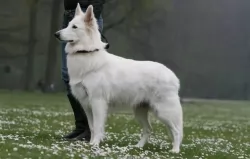 The Berger Blanc Suisse is also referred to as the White Swiss Shepherd. The dog shares the same ancestry with the German Shepherd. The beautiful white dog from Switzerland, is closely related to the White Shepherd. Both breeds are descended from the German Shepherd breed.
The Berger Blanc Suisse is also referred to as the White Swiss Shepherd. The dog shares the same ancestry with the German Shepherd. The beautiful white dog from Switzerland, is closely related to the White Shepherd. Both breeds are descended from the German Shepherd breed.
It was in 1967 that a certain Agatha Burch brought a White German Shepherd with her to Switzerland and also importing a female white German Shepherd from the UK. It was these 2 dogs who were believed to be the first breeding dogs for the Berger Blanc Suisse. After a number of years, the breed was officially recognized in July 2011. In the USA and Canada, these White Shepherd dogs have been accepted as a distinct breed.
 This Bichon Frise-Poodle cross is a small dog with big personality. The original hybrid is 50% Poodle and 50% Bichon Frise. This is considered a first-generation hybrid. The second-generation hybrid is 50% Bichonpoo and 50% purebred Bichon Frise or Poodle. Then third generation hybrids are a cross between two second generation dogs. There is no fourth generation and most breeders do not offer even a third generation. The original hybrid can be healthier than the parents, but any flaws tend to show up in 2nd generation hybrids and it gets worse with third generation. This dog should be hardy, well-proportioned and robust. They are small, sweet and sturdy. Because there are three different sizes of Poodles, there can be three different sizes of the Bichon Poo – Standard, Mini and Toy.
This Bichon Frise-Poodle cross is a small dog with big personality. The original hybrid is 50% Poodle and 50% Bichon Frise. This is considered a first-generation hybrid. The second-generation hybrid is 50% Bichonpoo and 50% purebred Bichon Frise or Poodle. Then third generation hybrids are a cross between two second generation dogs. There is no fourth generation and most breeders do not offer even a third generation. The original hybrid can be healthier than the parents, but any flaws tend to show up in 2nd generation hybrids and it gets worse with third generation. This dog should be hardy, well-proportioned and robust. They are small, sweet and sturdy. Because there are three different sizes of Poodles, there can be three different sizes of the Bichon Poo – Standard, Mini and Toy.
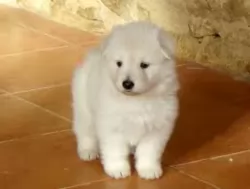 The medium-sized, well muscled Berger Blanc Suisse looks so much like the popular German Shepherd, and apart from its white coat, it has much the same physical standards. The females are about 55–61cm in height while the males are 60–66cm in height. The dogs dense, medium-length double coat tends to be slightly wavy but straight is more common. He has a long bushy tail.
The medium-sized, well muscled Berger Blanc Suisse looks so much like the popular German Shepherd, and apart from its white coat, it has much the same physical standards. The females are about 55–61cm in height while the males are 60–66cm in height. The dogs dense, medium-length double coat tends to be slightly wavy but straight is more common. He has a long bushy tail.
The Berger Blanc Suisse is somewhat longer than it is tall, but like the German Shepherd, it also has erect ears. In contrast to the white coat, the nose is black and the dog had dark, alert eyes.
This is an intelligent, confident dog and if you buy a puppy, of which the average litter size is 8, you will need to provide training and socialization to ensure he doesn't act totally independently and behave in a manner not pleasing to you. Once he is trained and socialized, he makes a wonderful pet and is social, playful and gentle. He is loyal and devoted to his human family, wanting to protect them. He is good around children and other pets in the home.
 The Bichonpoo is affectionate, intelligent and active just as you might expect from a Poodle/Bichon Frise cross. He loves people and lives well with other animals. He is particularly fond of children and loves to play with gentle older children. However, the temperament and characteristics of the hybrid are not as predictable as their parents. The characteristics of the Bichonpoo depends upon its lineage – if it is first generation, second generation or third generation. With each successive generation there is less predictability in the characteristics of the individual dog. Regardless of generation, the Bichonpoo will need exercise and mental stimulation. They are loving, good-natured and accommodating to their environment. They want to be with their owner and can get very attached.
The Bichonpoo is affectionate, intelligent and active just as you might expect from a Poodle/Bichon Frise cross. He loves people and lives well with other animals. He is particularly fond of children and loves to play with gentle older children. However, the temperament and characteristics of the hybrid are not as predictable as their parents. The characteristics of the Bichonpoo depends upon its lineage – if it is first generation, second generation or third generation. With each successive generation there is less predictability in the characteristics of the individual dog. Regardless of generation, the Bichonpoo will need exercise and mental stimulation. They are loving, good-natured and accommodating to their environment. They want to be with their owner and can get very attached.
Depending on their parents they can be anxious and high strung like the Poodle or nippiness and ‘small dog syndrome’ of the Bichon Frise. Separation anxiety can be a major issue with this breed. Do not let your Bichonpoo become dominate in your home or they will assume the alpha position and become very bossy, especially with children. He is easy to train and a good watchdog as well.
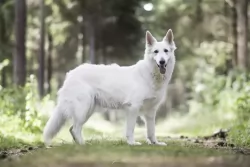 When you first set eyes on the Berger Blanc Suisse or White Shepherd, you can see that this is a strong, well-muscled, energetic dog, full of life and intelligent too. Add to that the fact that he is beautiful to look at.
When you first set eyes on the Berger Blanc Suisse or White Shepherd, you can see that this is a strong, well-muscled, energetic dog, full of life and intelligent too. Add to that the fact that he is beautiful to look at.
Your Berger Blanc Suisse dog is gentle and loyal with his own human family and will be somewhat wary of strangers. This dog is balanced, good-natured, friendly and affectionate and he just loves spending time with his family, being a good watch dog as well. He’s got so much going for him – good looks, a great personality, he is loyal, loving, strong, healthy and he’ll make one hang of a pet.
 The Bichonpoo is usually healthier than either the Poodle or the Bichon Frise. At the same time, they could inherit any of health concerns of either of their parents in the first generation Bichonpoo. They are however likely to develop ear infections and skin allergies. Cleaning and grooming is essential, especially the ears, but also to prevent matting which could lead to skin infections.
The Bichonpoo is usually healthier than either the Poodle or the Bichon Frise. At the same time, they could inherit any of health concerns of either of their parents in the first generation Bichonpoo. They are however likely to develop ear infections and skin allergies. Cleaning and grooming is essential, especially the ears, but also to prevent matting which could lead to skin infections.
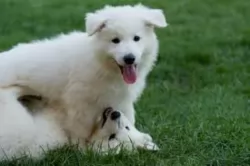 Your White Swiss Shepherd is a healthy, energetic, strong dog, but even so when you find him lethargic and listless, you want to get him to the vet for a check-up. It is always a good idea to be alert to common dog illnesses so that you know what to look out for in your dog.
Your White Swiss Shepherd is a healthy, energetic, strong dog, but even so when you find him lethargic and listless, you want to get him to the vet for a check-up. It is always a good idea to be alert to common dog illnesses so that you know what to look out for in your dog.
A common problem with dogs. The dog becomes restless and the abdomen is often enlarged. Get your dog to the doctor immediately.
This is a developmental defect of the hip and elbow joints and you’ll notice your pet battling to rise again after lying down.
This is a disease of the nervous system where the hind legs and feet drag. Sometimes the dog loses control over the bladder.
 The Bichonpoo is an energetic little dog and needs enough nutrition to keep up with his needs. Feed a Bichonpoo at least twice a day – small meals- and dry food because of dental issues. A high-quality food will help to prevent allegories.
The Bichonpoo is an energetic little dog and needs enough nutrition to keep up with his needs. Feed a Bichonpoo at least twice a day – small meals- and dry food because of dental issues. A high-quality food will help to prevent allegories.
The Bichonpoo is the product of the poodle who is prone to bloat and Addison’s Disease and the Bichon Frise who is susceptible to Patella luxation, progressive retinal atrophy and liver shunts. The first generation Bichonpoo should be free of these health concerns. You should be aware that there is a possibility that the first-generation hybrid could contract any of its parents’ illnesses or deficiencies.
This hybrid is a high energy dog and needs daily exercise in the form of walks and play. They have the intelligence and skill of the Poodle with the energetic desire to play of the Bichon Frise. They need toys and a person to play with. She will need to be both mentally and physically stimulated. If she gets bored she will become destructive and noisy with barks and whines.
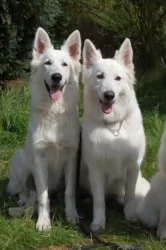 Apart from your Berger Blanc Suisse puppy need an excellent quality puppy food 4 times a day, as he gets older you will need to adjust his food to suit his high energy needs. Once your pet reaches a year of age you will know whether he requires one or two helpings of food a day. You can feed him a top quality commercial manufactured food or you can make your own home-made food for him which includes meat, rice and vegetables.
Apart from your Berger Blanc Suisse puppy need an excellent quality puppy food 4 times a day, as he gets older you will need to adjust his food to suit his high energy needs. Once your pet reaches a year of age you will know whether he requires one or two helpings of food a day. You can feed him a top quality commercial manufactured food or you can make your own home-made food for him which includes meat, rice and vegetables.
You want to make 100% sure he is getting the correct dosage of minerals and vitamins to ensure good health. To keep his eyes bright and his nose wet, include some raw meat into his diet as well. Make sure that he always has access to fresh, cool water.
Remember that your Berger Blanc Suisse is a working dog and he will need plenty of exercise. Apart from taking him on long walks, you can throw balls for him, buy rope toys for him and give him some rough and tumble. He is an intelligent breed and he will require some games that give him mental stimulation too.
Check regularly for fleas and ticks. You’ll pick this up with brushing his beautiful coat. Frequent brushing will help keep your dog clean and also remove all those loose hairs. Your White Swiss Shepherd Dog is a moderate, but constant shedder as well as being a heavy seasonal shedder so you will need to give him a good brush at least twice a week.